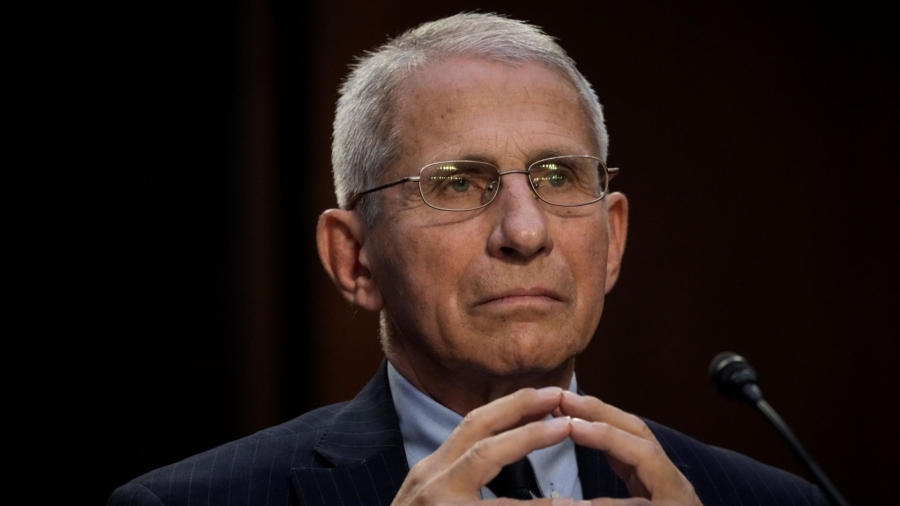Dr. Anthony Fauci, one of the most prominent figures in the U.S. government’s response to COVID-19, has said he’s worried about the country’s future because of disinformation.
Fauci, who served as the chief medical adviser to the president until the end of last year, joined The Hill’s Future of Health Care Summit on Thursday. During a discussion at the summit, Fauci vented his concerns regarding disinformation and misinformation going into the 2024 election cycle.
“I worry about the country a lot because what we’re seeing—and I think anybody who just takes a deep breath and looks at what’s going on—that we are in an arena, an era, of what I call the normalization of untruths,” Fauci told The Hill’s Editor-in-Chief Bob Cusack.
At one point during their discussion, Cusack noted Fauci’s AI-generated likeness appeared in a video shared by an account affiliated with the campaign of 2024 Republican presidential candidate Ron DeSantis. The ad featured real photos of former President Donald Trump and Fauci together during White House coronavirus press briefings, as well as fake images depicting Trump and Fauci hugging and kissing. The fake images of Trump and Fauci were generated using an artificial intelligence image generation program, according to an AFP Fact Check.
“There are so many misrepresentations and distortions of reality and conspiracy theory, that it almost becomes normalized,” Fauci told The Hill on Thursday. “We should not accept that as the new normal because when facts are no longer accepted as facts, when distortions occur and when reality is distorted, that will undermine the foundations of the social order and of our democracy. And history has shown us that.”
COVID-19 and Disinformation
Fauci had worked in the public health sector for decades, becoming the director of the National Institute of Allergy and Infectious Diseases (NIAID) in the 1980s. As the director of NIAID, Fauci became a member of the White House Coronavirus Task Force. Fauci gained increased public recognition during his regular appearances at press briefings to give updates on COVID-19.
Fauci also played a role in Operation Warp Speed, an effort brought about through the Trump administration to rapidly develop COVID-19 vaccines. Trump presented Fauci and other Operation War Speed participants with presidential commendations on his final day in office.
President Joe Biden kept Fauci after taking office, naming him chief medical adviser to the president on Jan. 20, 2021; a position Fauci held until Dec. 31, 2022.
COVID-19 has served as a source of numerous scientific and public health controversies. Fauci’s own role in the coronavirus response has been the focus of widespread scrutiny.
Early on in the outbreak, many prominent scientists focused on the hypothesis that the virus was the result of a natural transmission from a live animal and seafood wet market in Wuhan, China. Others posed a different theory, that COVID-19 leaked from a laboratory such as the Wuhan Institute of Virology (WIV), but the theory was criticized by government bodies and legacy media and suppressed on social media early on. Over the past three years, more and more researchers and officials have gradually come forward to voice their support for the theory.
Dr. Robert Redfield, former head of the Centers for Disease Control and Prevention (CDC), had been among the scientists who suspected early on that the COVID-19 outbreak was the result of a lab leak. In March, Redfield testified that he was left out of a February 2020 conference call with Fauci and other scientists in which they discussed the origins of the coronavirus outbreak. Fauci has denied playing any role in Redfield’s exclusion from that key conference call.
Fauci also offered changing views on a number of measures to prevent the spread of COVID-19, such as masking and lockdowns. He initially told Americans that it was not necessary to wear a face covering before backtracking and supporting widespread masking.
Several scientific studies have since questioned the efficacy of masking policies, but U.S. public health officials have continued to defend masking policies.
Disinformation and Public Debate
The spread of misinformation and disinformation could lead people to take health risks, as in the case of COVID-19. Inaccurate or false information could also sway public opinion in ways that harm people’s reputations or influence the electorate.
In 2020, The Washington Post published an article accusing Sen. Tom Cotton (R-Ark.) of promoting a conspiracy theory because he referenced the possibility that COVID-19 could have come from a lab leak. The article was originally titled “Tom Cotton keeps repeating a coronavirus conspiracy theory that was already debunked” but as later changed to “Tom Cotton keeps repeating a coronavirus fringe theory that scientists have disputed” and The Washington Post acknowledged there was no definitive answer on the origins of COVID-19.
Last year, scientists sued the U.S. government, alleging the Biden administration worked with tech companies to censor dissenting views on COVID-19, such as the Great Barrington Declaration, which recommended against widespread lockdowns. Emails between Fauci and other U.S. public health officials have revealed they discussed ways to rebut the Great Barrington Declaration. In a December 2022 deposition related to the lawsuit, Fauci insisted he did not ask social media companies to engage in censorship.

